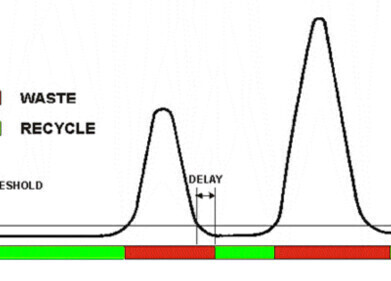-

-
 Figure 1
Figure 1 -
 Figure 2
Figure 2
HPLC, UHPLC
The Ascentis Express Biphenyl U/HPLC Column: A New Choice in Selectivity
Apr 27 2016
The Ascentis® Express Biphenyl is the newest stationary phase available in the Ascentis Express Fused-Core® line of U/HPLC columns. The unique retention and selectivity of this phase provide a complementary option for reversed-phase HPLC method development of small molecule analytes. The extended aromatic system of the biphenyl moiety yields a more polar stationary phase, increasing retention for compounds that are challenging to analyse using standard C18 chemistry. The hydrophobic, aromatic, and steric properties are inherently orthogonal to alkyl bonded phase columns, providing unique selectivity characteristics. Considering the types of compounds that are proving to be effective for use as small molecule pharmaceuticals, the biphenyl column is an effective tool for drug and metabolite analysis under conditions tailored to MS detection (Figure 1).
Ascentis Express U/HPLC columns are based on Fused-Core particle technology that greatly improves the kinetics of a separation. The narrow particle size distribution enables a more consistently packed bed while the thin, porous shell shortens the diffusion pathway of analytes, resulting in better mass transfer at high flow rates. The higher separation efficiency translates to better resolution, faster separations, and lower backpressure. These particles produce a rugged and reproducible column in contrast to other columns typically associated with this high level of performance.
The Ascentis Express Biphenyl is suitable for a range of complex-mixture analyses in clinical research, forensic toxicology, food, and environmental testing, utilising both particle technology and stationary phase chemistry to maximise chromatographic resolution (Figure 2). Orthogonal retention and selectivity compared to alkyl and phenyl stationary phases make it a valuable tool in HPLC method development. Analyses have demonstrated that the biphenyl stationary phase has greater selectivity differences when operating in methanol under reversed-phase conditions versus acetonitrile, providing an additional option to improve a separation. Adjusting selectivity by changing stationary phases is a useful alternative to complex mobile phases and additives that have the potential to effect reproducibility of an assay or limit the use of detection method.
Click here for information and registration for our Reversed Phase Method Development: Retention and Selectivity of Biphenyl Stationary Phase Chemistry online event.
Digital Edition
Chromatography Today - Buyers' Guide 2022
October 2023
In This Edition Modern & Practical Applications - Accelerating ADC Development with Mass Spectrometry - Implementing High-Resolution Ion Mobility into Peptide Mapping Workflows Chromatogr...
View all digital editions
Events
Apr 23 2024 Kintex, South Korea
Apr 23 2024 Seoul, South Korea
Apr 28 2024 Montreal, Quebec, Canada
May 05 2024 Seville, Spain
May 15 2024 Birmingham, UK













